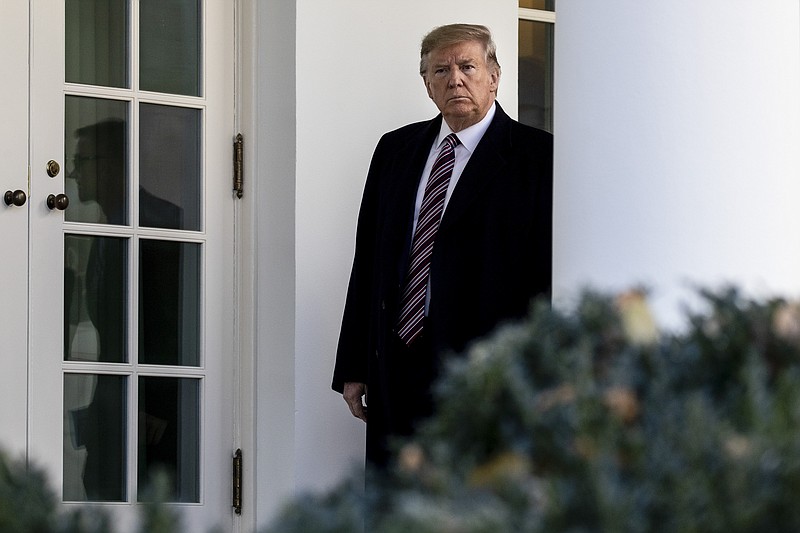Here we are. House Democrats on Tuesday morning unveiled two articles of impeachment against President Donald Trump - abuse of power and obstructing Congress in the investigation of his behavior involving Ukraine.
"We must be clear: No one, not even the president, is above the law," House Judiciary Committee Chairman Jerry Nadler of New York said during a news conference where he was flanked by House Speaker Nancy Pelosi of California and other House leaders.
Trump promptly had a meltdown on Twitter, and White House press secretary Stephanie Grisham said the president expects to be "fully exonerated" in GOP-led Senate trial.
We hope not, but we're not delusional. The final decision likely will remain with our November 2020 ballots. The upside is that in November, we can not only rid the White House of Donald Trump, we can also rid the House and Senate of those infected with the deadly Trump pox - an affliction that has eaten the souls of Republican politicians, including some we once thought of as statesmen.
At the heart of this impeachment is Trump's thwarted effort to shake down a foreign ally for political dirt that would serve only him. He tried to leverage a White House meeting and military aid, desperately needed by our ally Ukraine to combat Russian military aggression and allocated by Congress, to pressure newly elected Ukrainian President Volodymyr Zelenskyy into announcing an investigation of Trump's strongest presidential opponent, former vice president Joe Biden. Trump also asked for a Ukrainian probe of an unfounded theory that Ukraine, not Russia, interfered in the 2016 presidential election. The effort failed when a whistleblower's complaint alerted Congress and Trump's scheme was found out.
The Republicans in Congress are full of excuses. They say Trump was "understandably" worried about releasing aid to a country where there is corruption. They follow like lemmings when Trump claims falsely that Biden acted improperly years ago in threatening to suspend aid to Ukraine when he was vice president and his son sat on the board of a Ukrainian gas company. Biden, at the time, was acting in accordance with U.S. and international policy goals. There was no wrongdoing, though it was certainly unwise for his son to take that job when Biden was involved in Ukraine policy
Daniel Goldman, one of the Democratic staff lawyers who testified Monday, said there is an easy explanation for why Biden's move was proper and Trump's is part of a chain of impeachable offenses: "There is a distinction between doing an official act for an official purpose and doing an official act for a personal purpose."
But use your own common sense. Why would Trump ask Ukraine to investigate his political opponent? Why not insist Ukraine go after its own corruption? And if Trump thought Biden was corrupt, then why not investigate Biden in America with our own FBI and Justice Department?
Ditto those same questions about the false narrative that Ukraine, not Russia, interfered in our 2016 election. Special counsel Robert Mueller conducted the Russia probe and concluded (complete with the indictments of about two dozen Russians and a number of Trump associates) that Russia sought - and still seeks - to interfere in our elections. If Trump thinks it was Ukraine instead, why didn't he get Attorney William Barr to appoint another special counsel to probe Ukraine?
Answer: Trump didn't care about Ukraine corruption. He sought dirt for his own re-election campaign. And there's another plus for Trump. Ukraine is under attack from Russia - the same Russia that Trump is always making excuses for and defending. There is a reason Nancy Pelosi says that with Trump all roads lead to Russian President Vladimir Putin.
Here are more questions we know the answers to, thanks to the impeachment hearings. (Spoiler alert - the answers, as offered under oath, are all "President Trump.")
Who sent Rudy Giuliani to Ukraine to pressure Ukraine and smear Joe Biden? Who does Giuliani work for? Who fired the anti-corruption U.S. ambassador in Ukraine? Who told other ambassadors, Gordon Sondland and Kurt Volcker, to work with Rudy Giuliani? Who told Vice President Mike Pence not to go to Zelenskyy's inauguration? Who ordered his own chief of staff, Mick Mulvaney, to withhold critical military assistance for Ukraine? Who refused to meet with Zelenskyy in the Oval Office? Who ignored on July 25 his own national security council's anti-corruption talking points (which did not mention Biden)? Who asked Zelenskyy for a favor? Who personally asked Zelenskyy to investigate Biden? Who told Zelenskyy to work with Giuliani? Who stood on the White House lawn and confirmed that he wanted Ukraine to investigate Biden? Who also said China should investigate? Who has blocked us from hearing from others involved, such as Mulvaney and Secretary of State Mike Pompeo?
On Twitter, Trump implored: "Read the Transcripts! "us" is a reference to USA, not me!" he wrote, referring to the July 25 "do us a favor though" call.
No, an appropriate favor for the U.S. would not be a political favor for Trump - or Biden, or any other candidate. It would be about international policy or national security.
American legal scholar Laurence Tribe puts quite succinctly why President Trump is uniquely dangerous for America and should be impeached: "Neither Russia-gate nor Ukraine-gate was a one-night stand," Tribe wrote in the Washington Post. "Trump has been revealed as a serial abuser of power, whose pattern of behavior ... makes clear he will repeat the same sequence again and again."
The only question that remains now is what Congress - and we Americans - will do about it.
